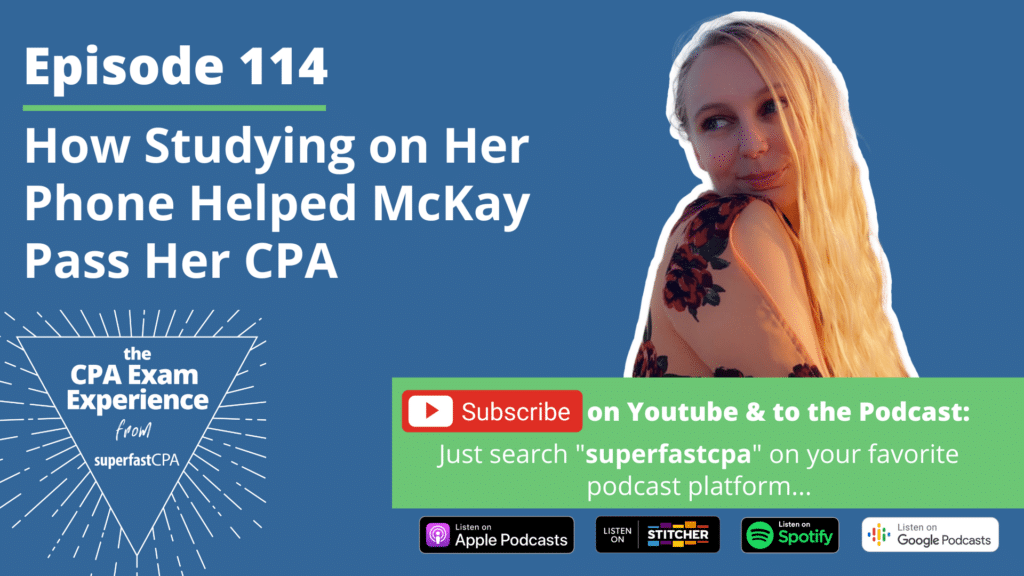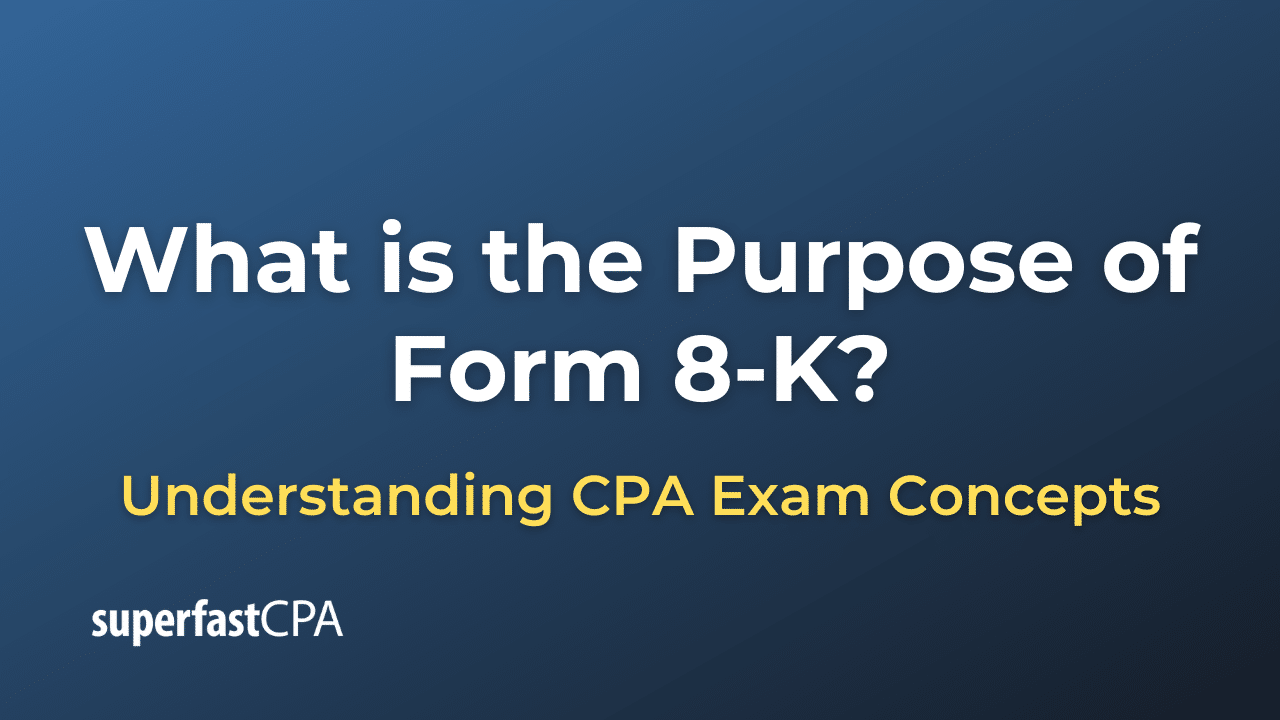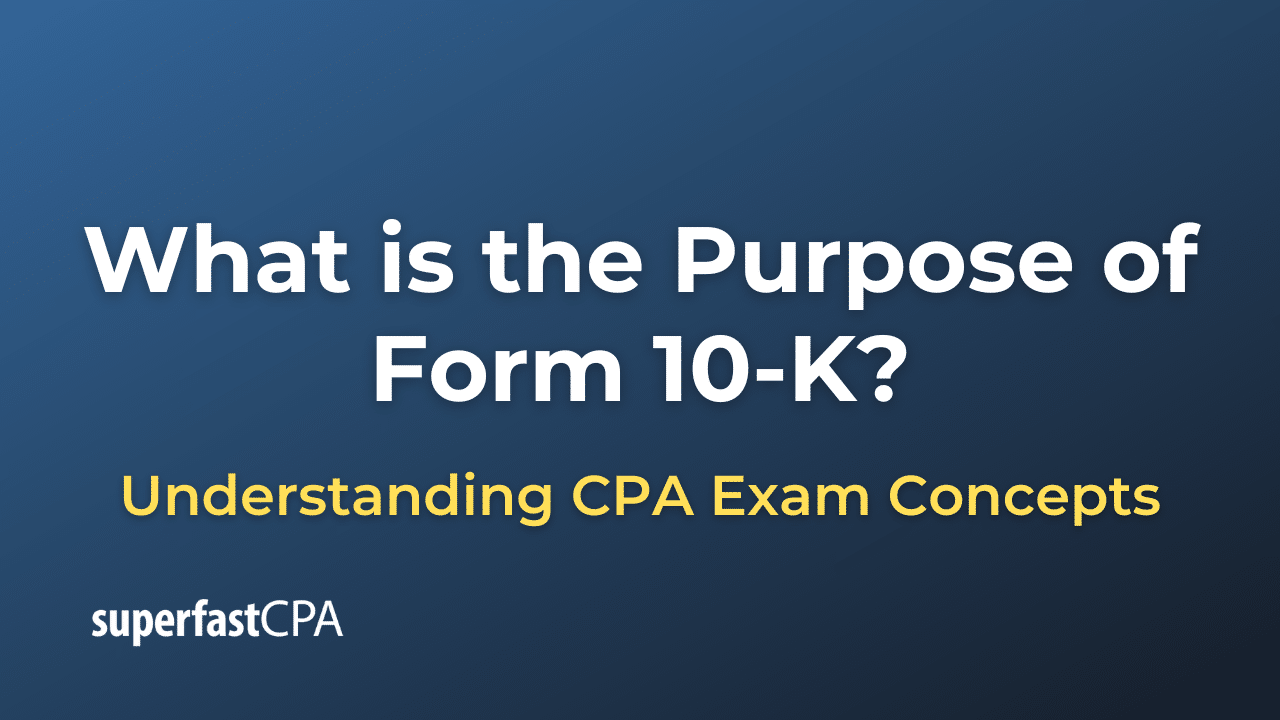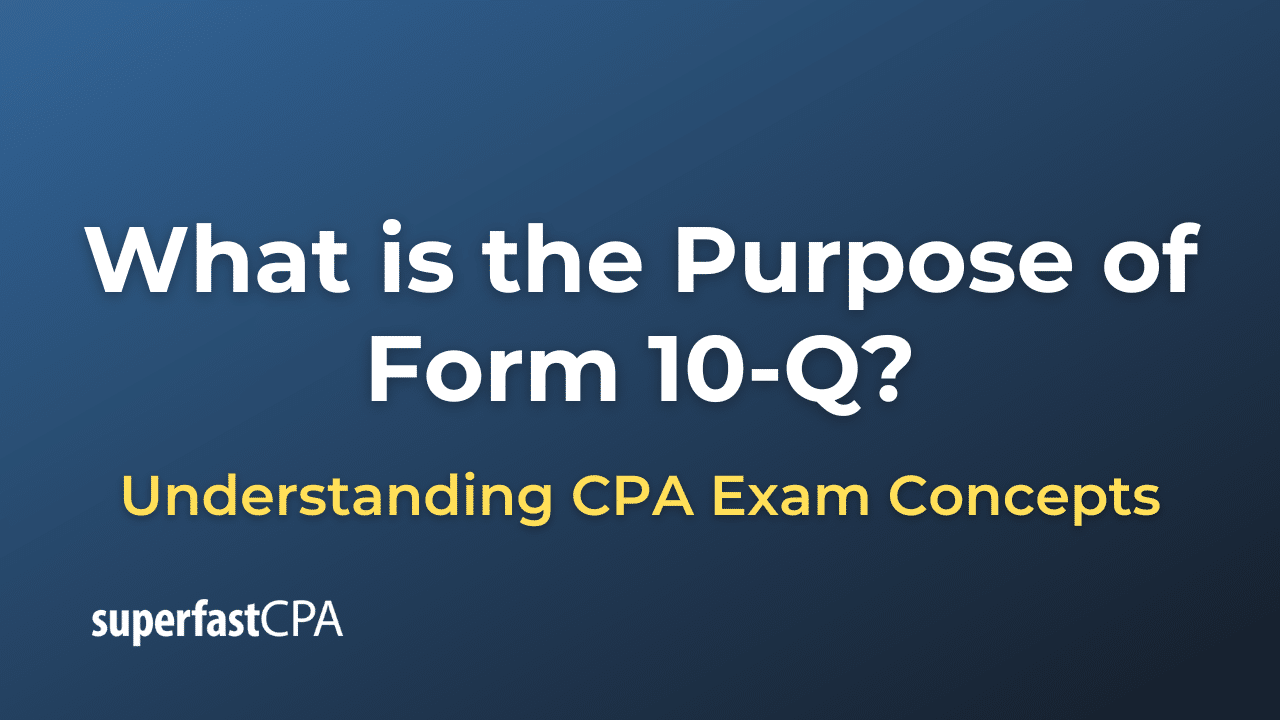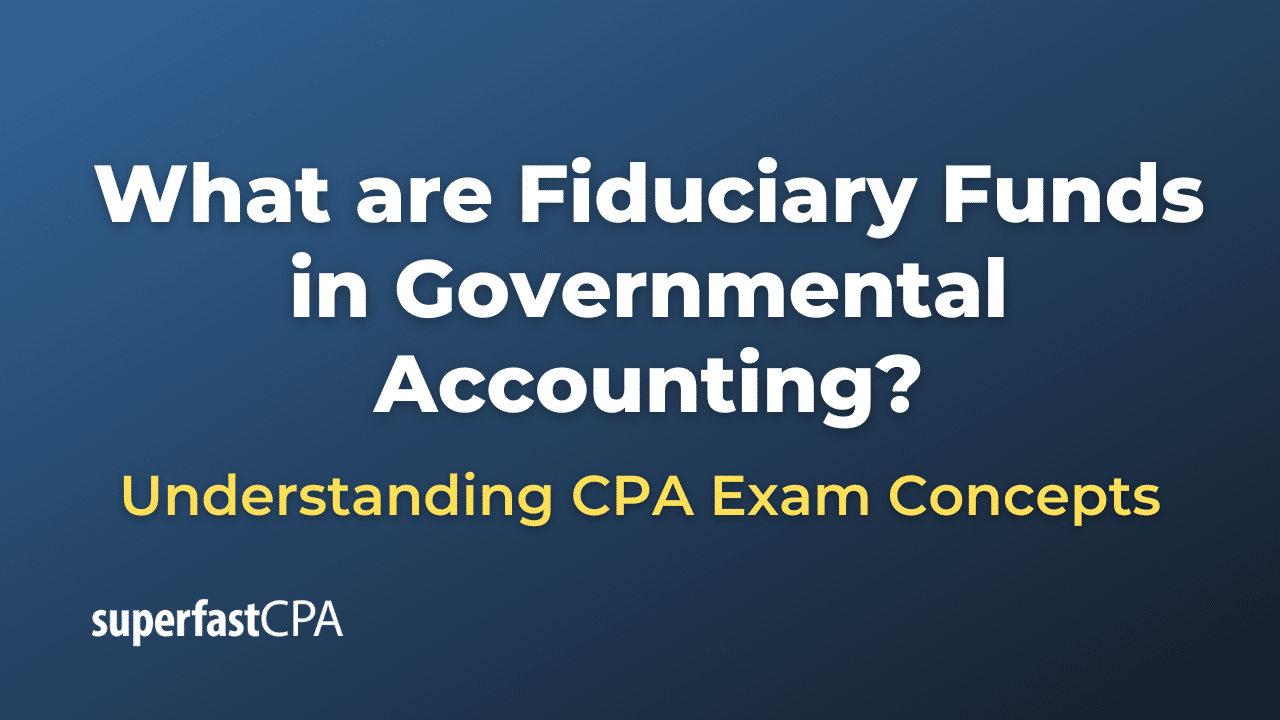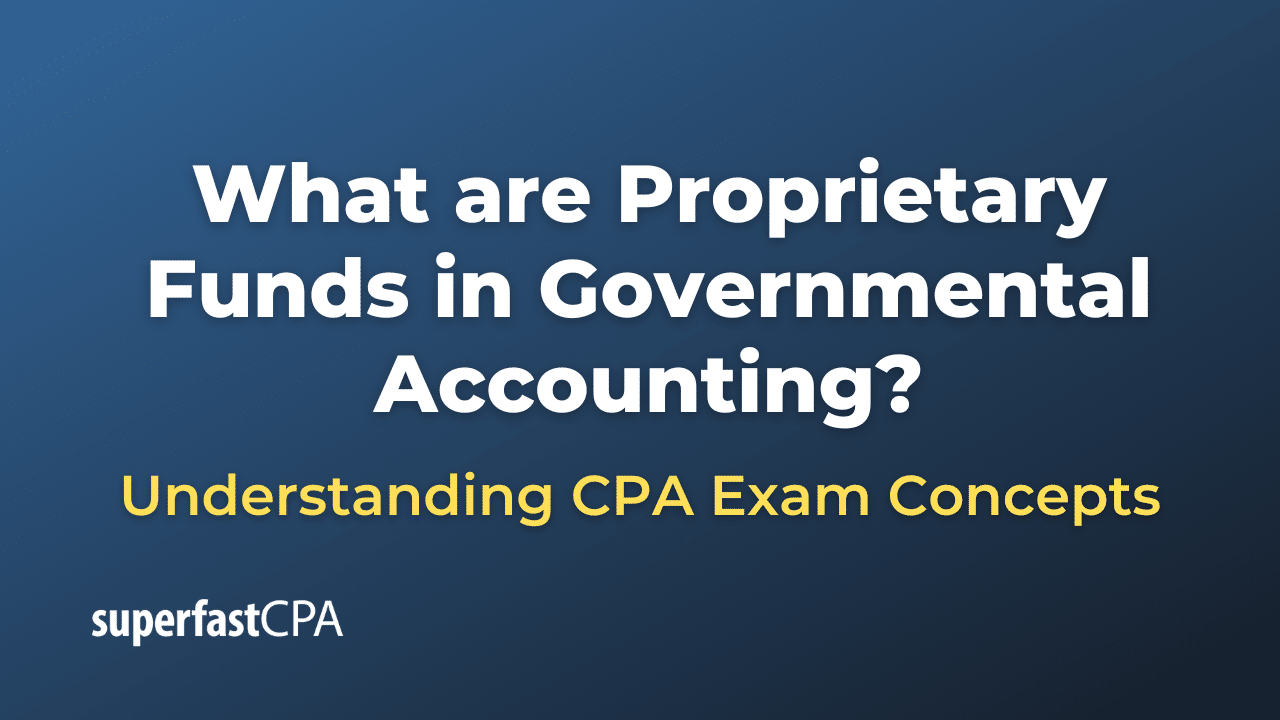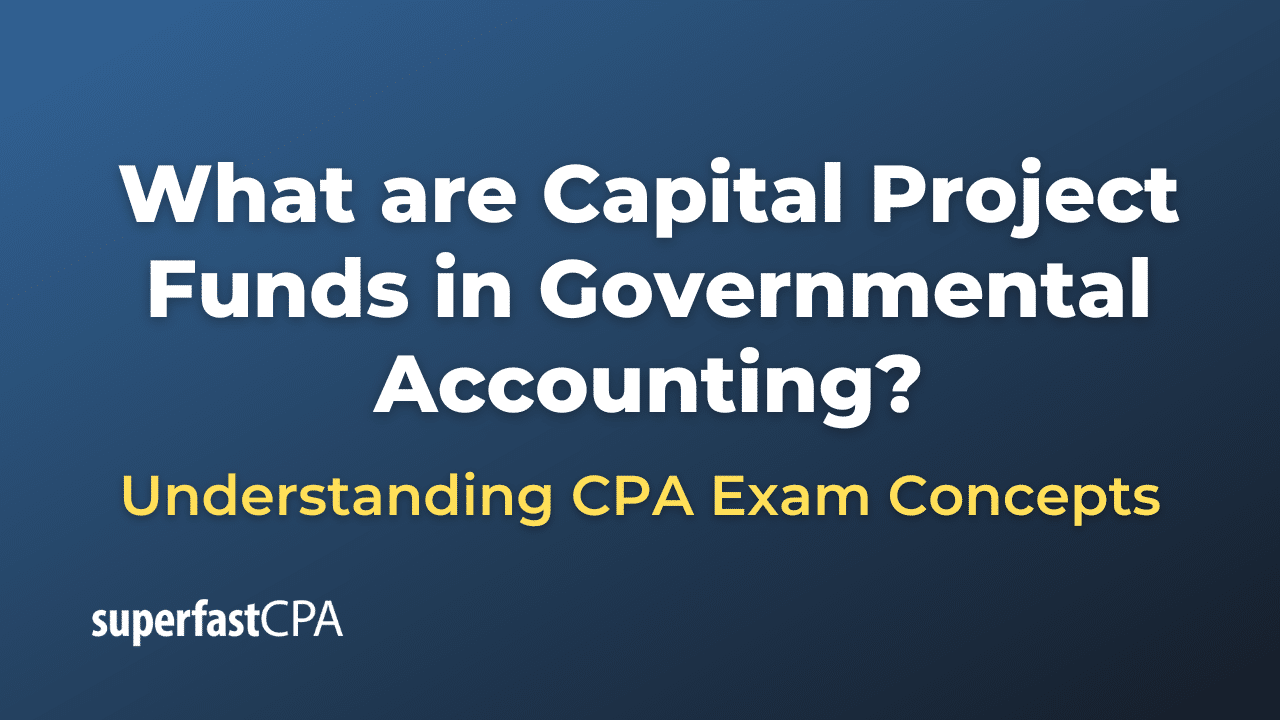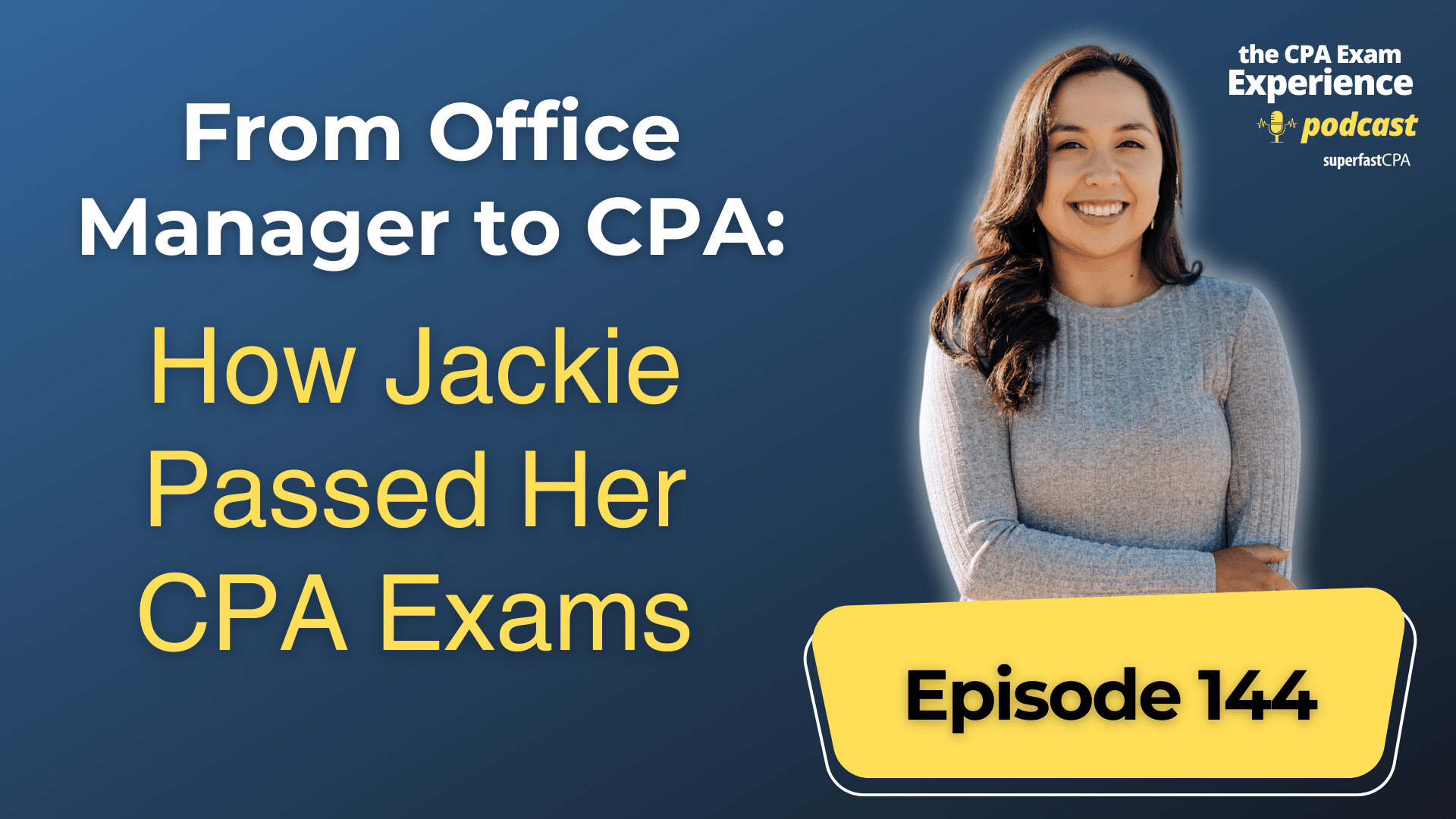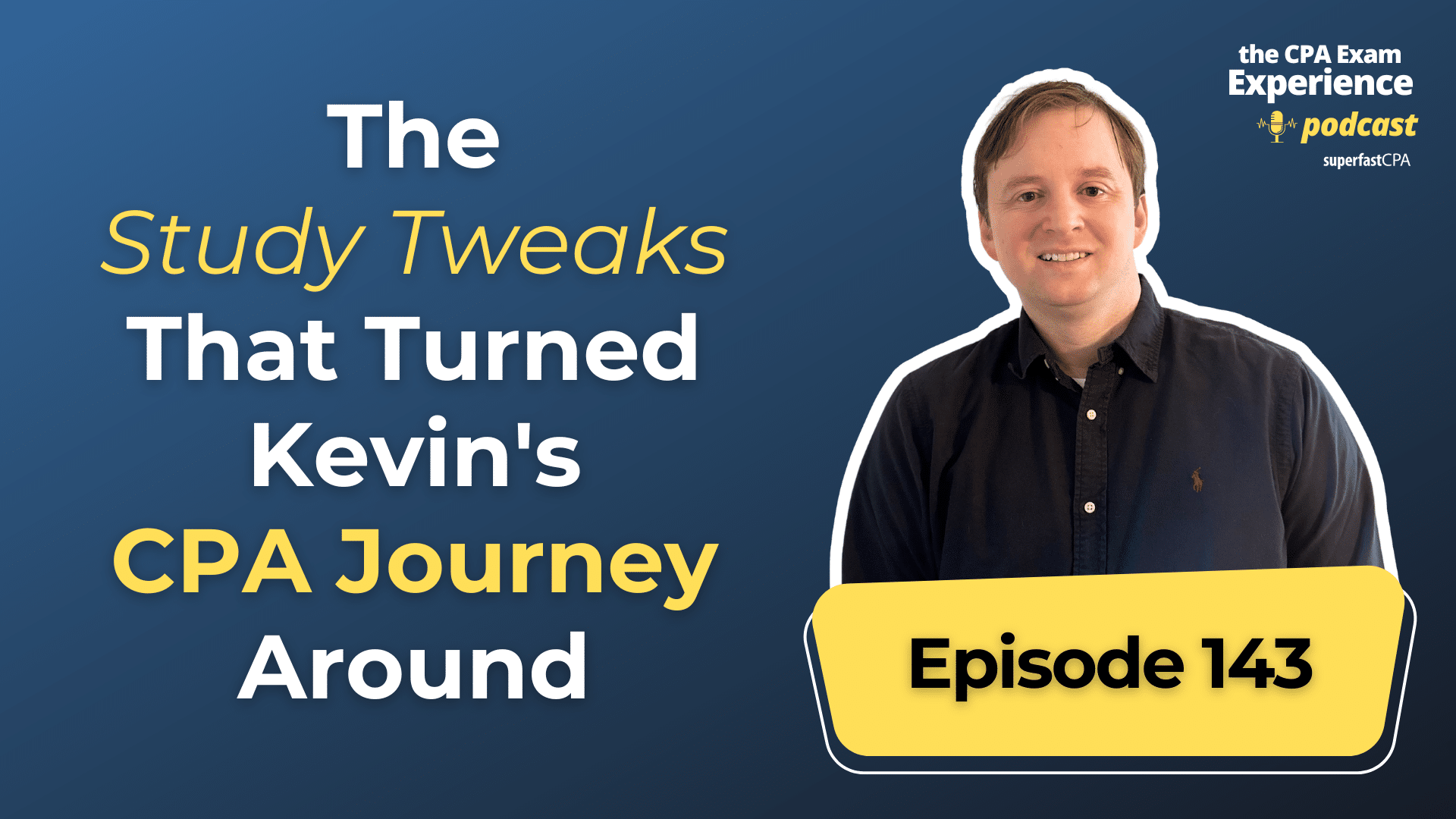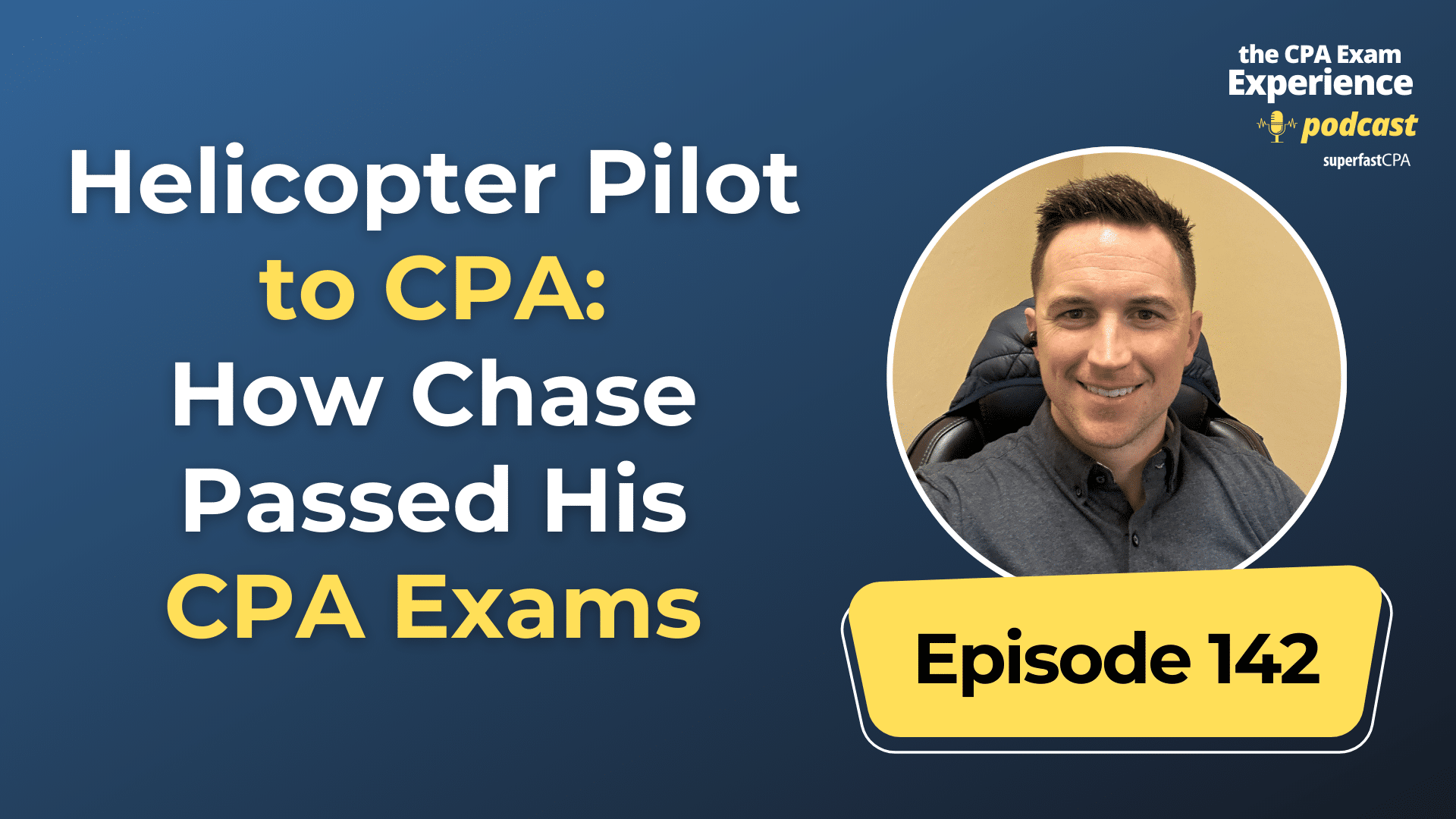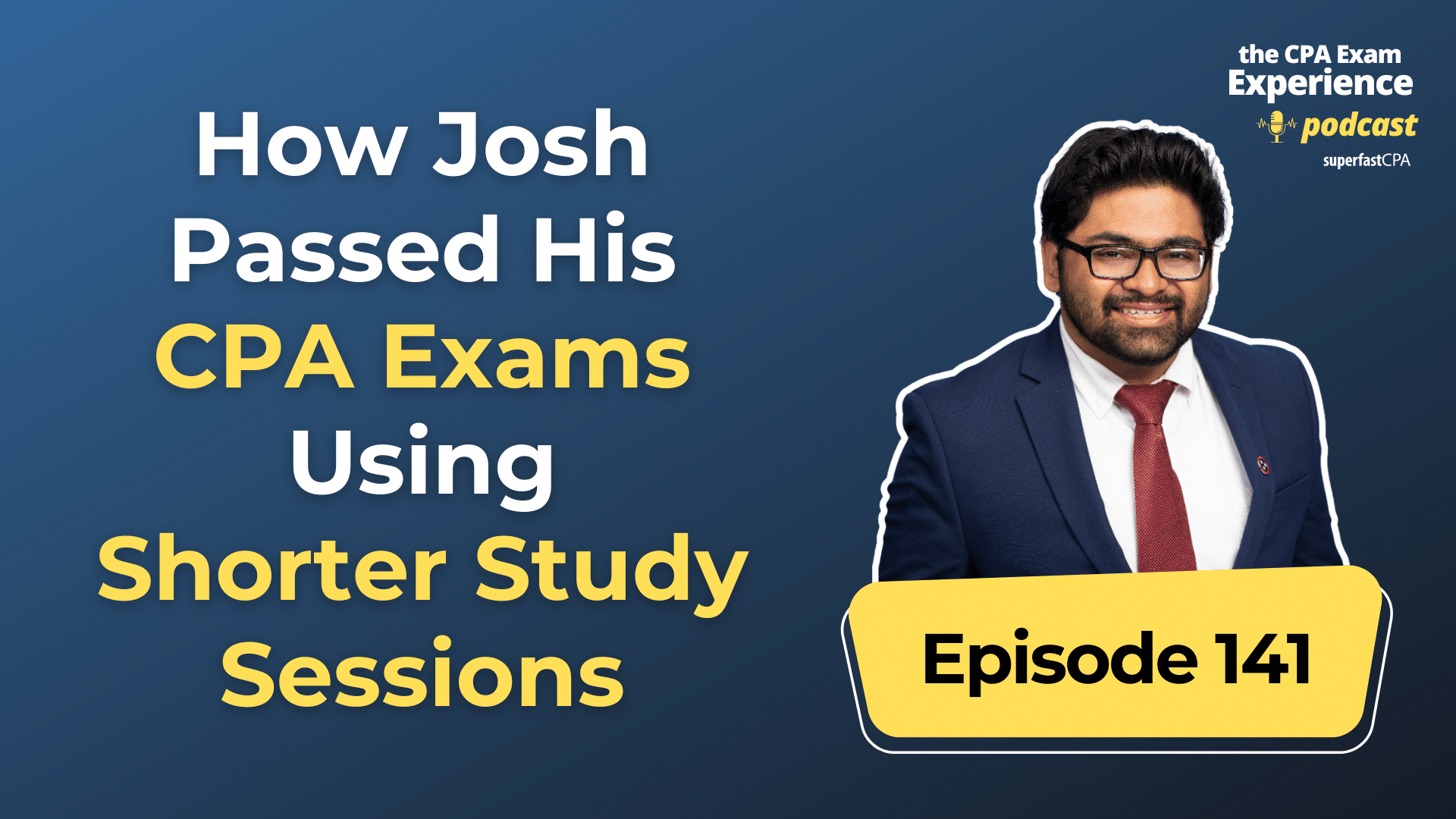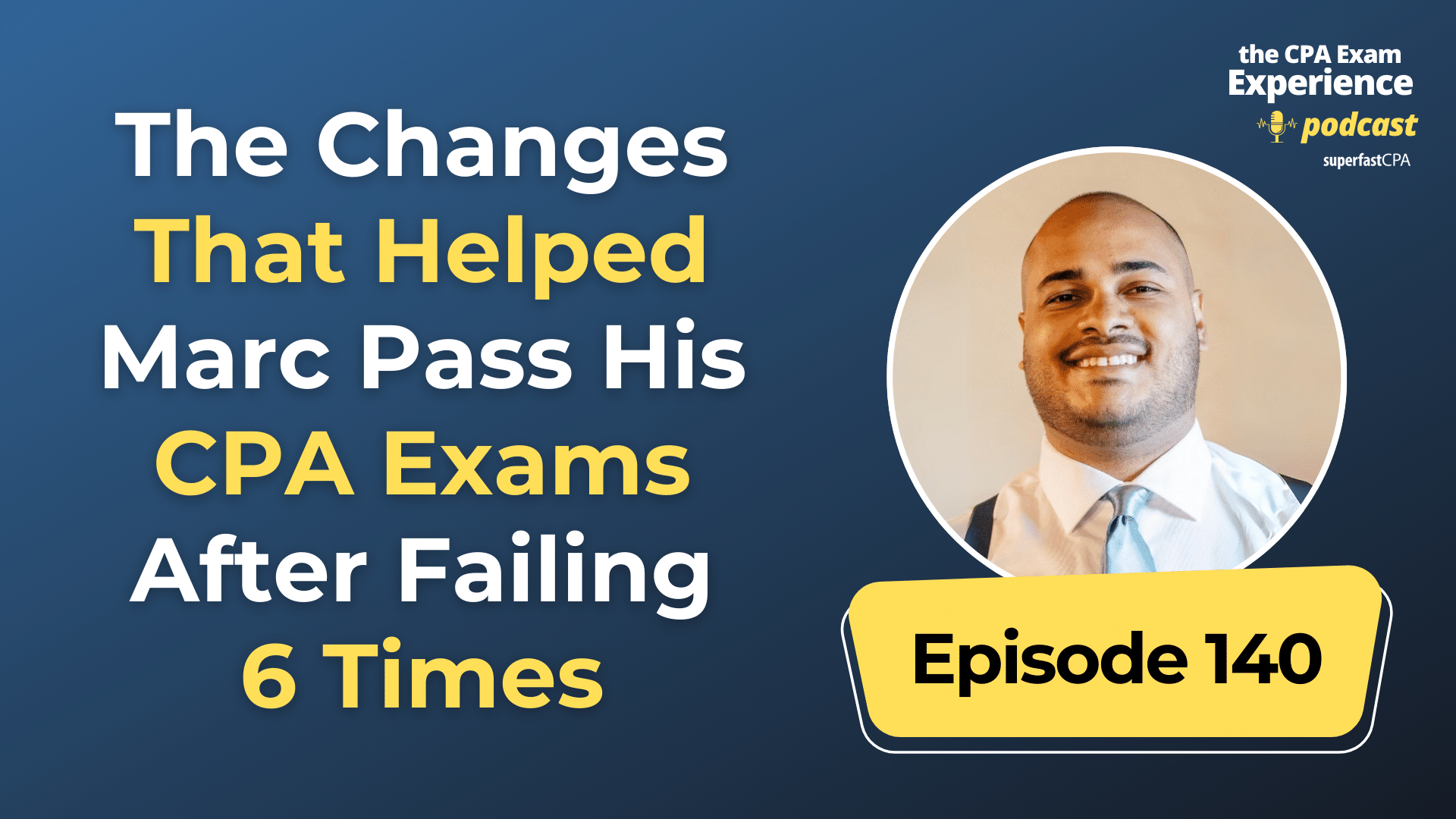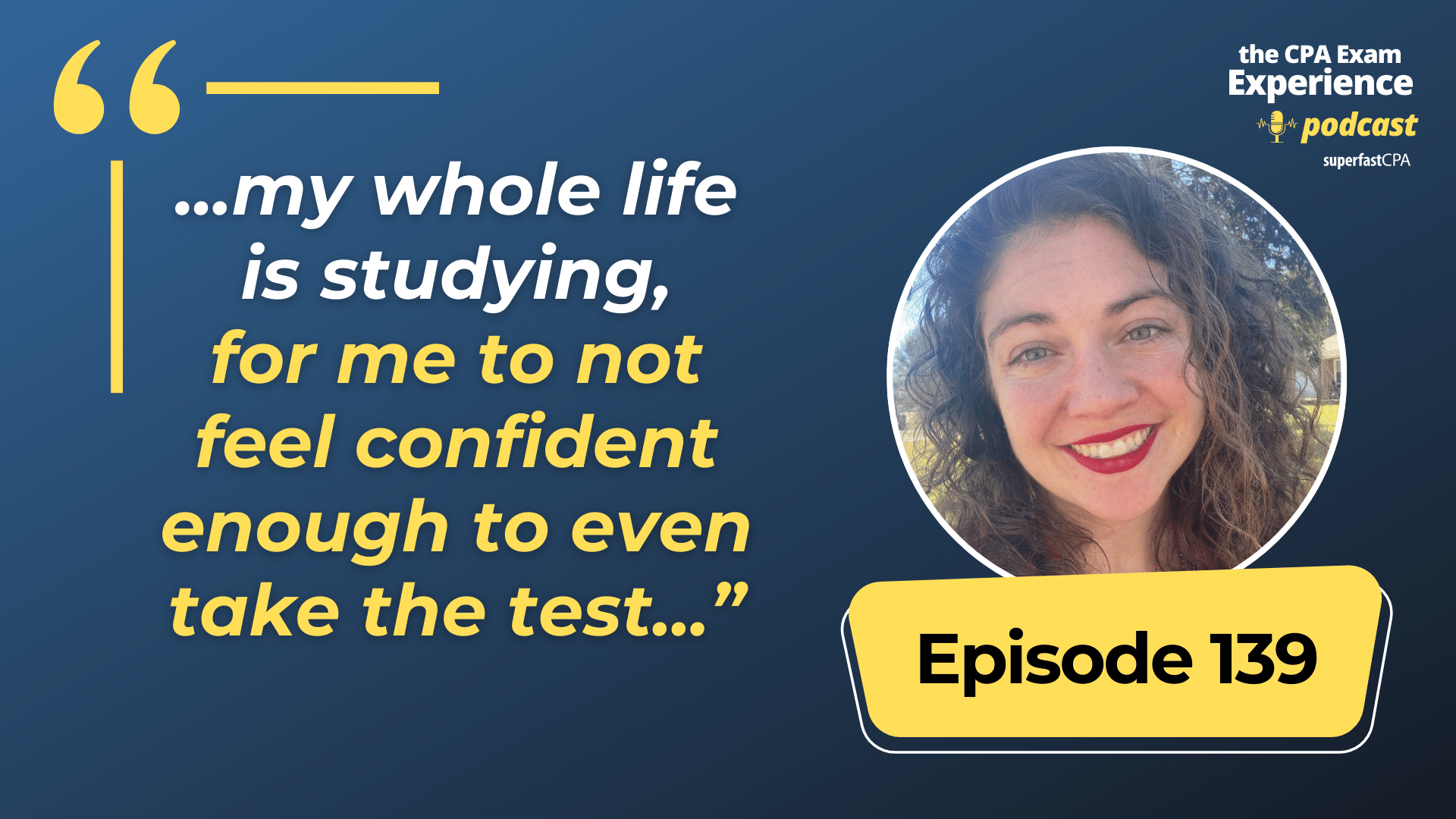In this SuperfastCPA podcast interview, you’ll hear how the CPA exam material starting clicking for McKay once she made studying from her phone a habit.
Her previous study routine kept getting her so close to passing scores, but it was adding mini study sessions from her phone throughout the day that pushed her over the top to passing all four CPA exams.
IMPORTANT LINKS:
Master your study process by attending one of our free study training workshops: https://www.superfastcpa.com/study-secrets/
Enter our free monthly podcast giveaway: https://www.superfastcpa.com/enter
Episode Timestamps
- 00:00 McKay interview
- 00:50 Intro
- 05:02 McKay Talks About Her CPA Journey
- 06:32 When McKay Found SuperfastCPA
- 07:47 The Change That McKay Did Which Resulted to Passing the Exams
- 10:15 McKay Didn’t Study for the Sims Since She Struggled More With the MCQs
- 11:03 How McKay Studied By Breaking Down Her Review Course
- 12:22 The Reason Why She Had to Refocus Studying
- 14:11 Once McKay Got Her Study Process Down, She Even Took Weekends Off
- 15:57 Plan Out Dates Ahead of Time To Cover All the Material
- 16:27 McKay’s Process on Taking Notes for Difficult Topics
- 19:24 What Gave McKay the Edge to Reach That Passing Grade
- 21:47 Utilizing Study Tools for Mini Sessions Throughout the Day
- 24:28 Finding Opportunities to Study
- 25:40 The Reason and Order McKay Planned to Take the Exams
- 28:18 McKay Talks About Her Daily Study Routine
- 29:43 Having the Evenings Off and Catching Up on Weekends
- 31:53 The Feeling of Excitement After Finally Passing the CPA Exams
- 32:57 How McKay Studied the Normal Way and Why It Didn’t Work
- 35:45 McKay’s Process for Learning New Topics Through Questions First Approach
- 38:02 How McKay Break Downs Calculation Heavy Questions
- 40:10 McKay’s Test Day Experience
- 42:04 What McKay Did for Questions She Is Unsure
- 44:16 McKay’s Top Tips for People Still Struggling With the CPA Exams
- 45:33 Taking Intentional Breaks Only When On Schedule
- 46:42 Have a Community to Share and Help Each Other
- 48:39 What Motivated McKay to Get Her CPA
- 51:03 The Most Beneficial Thing from SuperfastCPA
- 52:36 Outro
Interview Transcript
McKay: Like you’re staring at a screen all day and then you’re trying to stare at a screen like the rest of the evening like, it just didn’t work.
McKay: Like I’m already tired, it’s dark out. Like I don’t wanna be studying right now. Like the attitude was just so much more negative than like doing it in the morning, and I’m more of a morning person anyway. My mind is more fresh in the morning. I’d always like work out or do studying or anything in the morning anyway before I’d usually go to work in college. So it just made sense.
McKay: I think that was a thing like college like, the studying for college and then for the CPA is totally different. So it’s just a while trying to figure out, like, I don’t even know how to study for this, and I don’t really tell you in college how to do that.
Intro
Nate: Welcome to the CPA exam experience podcast from SuperfastCPA. I’m Nate and in today’s interview, you’re going to hear me talk with McKay.
Nate: So McKay was active in our members forum, so I’ve kind of been aware of her progress along the way as she worked through and passed each section. And one of the main things you’ll hear her talk about in her interview was that it wasn’t until she made the mini sessions a priority that she really started getting good results in passing each exam.
Nate: So she feels like the mini sessions, which really just means studying from your phone in all the little chunks throughout your day, adding in the extra study time that you wouldn’t get otherwise, that’s really what made the difference when she started taking those seriously.
Nate: So, as I’ve said a thousand times, studying from my phone, that was the key difference maker because I only had two hours to study in the morning. I just felt like I could not possibly study after work when my brain was tired. So studying from my phone all throughout the day, and I did that relentlessly, was absolutely key to my process and passing the exams really quickly, and that is why we’ve created the SuperfastCPA study tools that are meant primarily for the mobile study experience and they’re optimized for people studying from their phone.
Nate: So, you know, the apps that come with your review course is of course, a review course in an app. Which really is kind of a nightmare, and most people don’t use them very often because it’s just not practical to use in little three to five minute chunks all throughout your day.
Nate: But our study tools are, they’re made specifically for that reason and our app is super simple for that reason.
Nate: Anyways, you’ll hear McKay get into the details of how she used our study tools specifically. And why she feels like they were so helpful in making the difference in her process.
Nate: So before we get into that, just want to mention two things. First, our free study training. As you’ll hear in this episode with McKay, that was also the first thing she saw from us. So these free one hour webinars, we walked through our best strategies, why it’s so different from the traditional study method that most people use with the CPA, usually with their CPA review course, and why it’s so much more effective. And once you watch one of these trainings, you will see why it works so much better.
Nate: So to sign up for one of those trainings, the link will be down in the description of this video on YouTube or in the podcast version.
Nate: The second thing is our free podcast giveaway. So each month we give away three pairs of Power Beat Pro headphones to three people who have entered the giveaway. It’s just your name and email. The idea with that is first, they’re my favorite headphones that I’ve ever used. I use them constantly to listen to audio books or podcasts, but the idea for you while you’re studying is you can easily rack up study time with our audio notes. The audio is such a good tool because you can be doing other things while you’re getting extra exposure, extra practice to the concepts via the audio notes.
Nate: So, the link to that will also be down in the description of this video or podcast episode, and with that out of the way, let’s get into the interview with McKay.
Nate: So I was just looking in, like I said, looking through your posts and about a year ago, according to the forum, you had made a post saying that you were really close, but you were starting to refocus and you hadn’t passed any sections yet.
Nate: So in less than a year from today, you’ve passed all four it sounds like. Is that what happened?
McKay: Yes, that that’s correct. I think I passed, I took my first one last year in January, I think it was AUD and I think I got the results back in last February, 2022 and passed that. And then I got results for my last one, which I think was FAR in December saying I passed.
McKay: So I think I did it in just under a year. Yeah.
Nate: Yeah. That’s awesome.
McKay Talks About Her CPA Journey
Nate: Okay, well let’s go to the, like the beginning, beginning. When did you start the CPA, you know, exams for the first time?
McKay: Okay, so I I graduated college in 2019, so in May, and then I took a break because I had like other life things going on.
McKay: So in 2020, in January is really when I started studying and everything, or trying to look into passing the CPA. I scheduled a test I think for AUD like in April, and that was like the exact month, I guess they like shut everything down. So I kept getting like pushed back. So I don’t think I could take it till like August or September of that year.
McKay: So it was just really hard to stay focused. Cause I’m like, well when am I even gonna be able to take this test? Right. And I was doing, you know, all the normal stuff, just like reading through the notes, taking the quizzes. It was like I would get off work and study for like three or four hours and felt like, wow, I learned nothing.
McKay: And that being said, when I did finally take it, I think I got like a 74 or something. I mean, it wasn’t bad, but it was like also disappointing because you know, you’ve been studying for so long. Yeah. And then so kind of did that like a couple times with a couple of the other tests, just okay, I got tired of doing AUD.
McKay: I would try to do FAR and I would get in the seventies and then realized in like middle of like 2021, like I kept trying to retake FAR and just failing.
When McKay Found SuperfastCPA
McKay: So in the middle of 2021 I was like looking at YouTube videos, being like, okay, I can’t spend four hours every day studying like I just, yeah, I need to find like a different way.
McKay: So I didn’t find you right at first, but I did find somebody else. I don’t even remember who it was, who was like, just focus on doing multiple choice questions over and over and over again. So that’s what I kind of changed to doing and I got really close to passing but still didn’t. I was getting really discouraged because all the videos I, were seeing were people who just graduated, had the summer off and just like blew through all their tests before they started working full-time.
McKay: And I was like, this is not helpful. Because I was working full-time at that point, so. So then I found your videos, yeah, I think in the middle of like 2021 and listened to you, your like free lecture and then bought your course. And then I think I didn’t quite get the study process. Like I didn’t get the mini quiz, like the mini, mini sessions well, sessions, yes.
McKay: So I, uh, I was doing better and I was enjoying, you know, like having the evenings off. Cause I switched to studying in the mornings instead of the afternoon and I was like, that makes way more sense.
The Change That McKay Did Which Resulted to Passing the Exams
McKay: But I wasn’t hitting the mini sessions really hard, so that’s when I started to refocus in like 2022.
McKay: Like, okay, I’m gonna break everything out by numbers. Like, I was like, okay, so I work for eight or nine hours, I need to, in one of the hours I usually listen to the audio notes was my plan. Cuz I don’t, I work from home most of the time, so I don’t really commute. So that’s not really an option to like listen very much to the audio notes.
McKay: So I listened to like an hour, like on my lunch or in the morning while I was getting ready. or when I was just like slow and I was just doing mi mindless work, I would listen to the audio notes and then I broke it down. I’m like, okay. I could probably do six or seven mini quizzes throughout the day cause that was about an hour, one every hour.
McKay: And then on my lunch or after work, I would read, I’d break out how many pages there were of the review notes, and I would be like, okay, I’m gonna try to get through this in a week, so I need to read like what, 15 or 20 pages today. So that made more sense to me cuz I was doing it really haphazardly before I’m like, I need to break everything down.
McKay: I was doing that in the morning for my main session too. I was like, okay, how many do I need to get through so I can have like, I think a week or two weeks to review how many lessons do I need to get through today, like every day. So that really helped me. I had to break everything down and then it started, like I started passing.
Nate: Okay. And that is a really good point. Giving yourself milestones, right, is basically what you’re describing. Like, I’ve gotta do this much of each thing each day to get through it x number of times or to get through the questions by this date or to read the notes once a week, it means this many pages a day.
Nate: Cause you’re right, it’s quoting just time amounts, like yeah, study for two hours. Well, it’s like, If you’re rewatching a video lecture for an hour and a half of that and then maybe doing a few questions, you didn’t really get that much done in two hours.
McKay: Right.
Nate: But yeah, a, uh, concrete things to like, shoot for, that this happens every day in five weeks or whatever. I will have gone through the notes eight times and listened to the audios eight times. That’s, that’s a really good point. So, yeah, doing that, that kind of changed everything it sounds like.
McKay Didn’t Study for the Sims Since She Struggled More With the MCQs
McKay: Yes, it did. And then honestly, like, which is the weird part for me, I didn’t study sims that much because I really struggled more with the multiple choice, especially since I had taken it in the past.
McKay: Like I usually wanna be like comparing to people who passed, to people who failed. You know, it’d be like comparable. Not comparable or better than people who passed. My sims are always better than, so I never really had to study for those.
Nate: That’s rare.
McKay: I really just needed.
McKay: Yeah. Yeah. I know, I guess it just makes more sense to me.
Nate: Yeah.
McKay: And it may also be the Sims I got, I don’t know. So I didn’t study a whole lot. Like if I had extra time on the weekends, I might like hit a couple but be like, okay, I feel like I got that. So I’ll go back to doing multiple choice questions.
Nate: Okay.
How McKay Studied By Breaking Down Her Review Course
Nate: And then, so you just looked in your review course, it sounds like, and saw there’s, was it like by lesson, the way your review course broke it out and you just counted ’em like there’s 50 lessons. So for me to be done in six weeks, it’s this many a day. That’s basically how you did it?
McKay: Yes. So I would actually, there was no easy way. I would literally count. I would be like, okay, there’s over like, what, 150 to 200, like little lessons. And then in between, those are like little tests that I’m like, okay, I don’t necessarily have to take those, so I didn’t count those.
McKay: So I just counted, yeah, every lesson and I had Wiley. So for, you know, the smaller, like less contact ones, like AUD and BEC it was like more like 150, 175. And then FAR and REG are more like, 175 to like 200, 215. So it would vary. I would also be like, reassess like every, when I was like halfway through, like every couple of weeks.
McKay: Cause sometimes like the early lessons are easier so you get through them faster. So that means, okay, I can do less near the end. Or if I’m, you know, really feel like motivated and everything’s clicking, I can do more. So sometimes I would be ahead of schedule just doing it that way.
The Reason Why She Had to Refocus Studying
Nate: Yeah. And at some point, I mean, you’re on the forum, so you had our, like the PRO course or whatever.
McKay: Right.
Nate: Did you go in at some point and watch all those videos?
McKay: Yes, I watched that at the beginning in 2021, but like I said, I didn’t really do the mini sessions right. I think that was, was really killing me. I wasn’t being consistent with it. Like I’d consistently listened to the audio notes, but I didn’t know how to like implement the reading or the mini quizzes very well.
McKay: So that’s why I had to like restart in 2022, being like, okay, you need to take one every hour. Okay, it’s nine, you be taking one. It’s 10, you need to be taking one.
Nate: Yeah.
McKay: So yeah, that was, I just had to refocus on that. And then I think actually whenever you do, I think it’s, I don’t know if you do it once a year or twice a year, but you’re like, okay, if so many people like, uh, pass, you can enter to pass, and you pass this, you win a gift card.
McKay: I think I won the gift card for the first one I passed, so it was very, I finally passed one. I was so excited, and that was just like bonus on top of it.
Nate: That’s awesome.
McKay: Yeah.
Nate: Yeah. That must have been, uh, I don’t think I set one of those up this year. Well, I didn’t. That must have been last January.
McKay: Yeah.
Nate: Or it went into February or something. Okay.
McKay: Yeah, it was something like that. So that just felt like a confirmation that I’m like, okay, I’m doing things right. I just need to keep the momentum going.
Nate: Yeah, definitely. I mean, and once you pass one it is, it’s just confirming, okay, what I’m doing is working. And I just think it gets a lot easier to get yourself to do it each day because like if you just feel like it’s not working and you fail and fail, you know, you start to think like, why am I even doing this?
Nate: But if it’s working, then it’s way easier to stay motivated.
Once McKay Got Her Study Process Down, She Even Took Weekends Off
McKay: Yes. And I think I passed the first two, like I passed. My first one, January, found the results in February, and then REG, I think I took in late March and found out in April that I passed. And then I took like, I think like, a couple weeks breaks and then restarted again.
McKay: Uh, what was I gonna say? But I don’t think I studied on the weekends very much like I did. I would catch up on my mini sessions if I didn’t, but I needed like either Saturday or Sunday off on the weekend, like a little break from all of it. Yeah. And I’ve noticed, like when I did that strategically, actually I would do better on Monday on like my 30 overall multiple choice.
McKay: I don’t know what it is. It gave my brain a break and I was like, okay, we’re ready to refocus here.
Nate: Yeah. And that’s, you know, that’s a good point. If it’s intentional, you know, and the other thing is, it’s one thing I tell people a lot, it’s like, listen, if you’re passing sections, you can do whatever you want.
Nate: If you’re passing and taking the weekends off, I mean, great. But you know, if someone’s like starting from the beginning, they’re like, well, I’m only gonna study three days a week cuz that’s all I want to do. And then it’s not working and it’s not working. It’s like, okay, well obviously you know, you gotta change some things.
Nate: But once you have things working, whether that’s taking the weekends off or studying in the evenings and not in the morning. I mean, if it’s working, it doesn’t matter how you do it, right?
McKay: Right. And I’d always shoot for like five or six days a week, and if I was ahead, I could take maybe two days off on the weekend if I was behind. Okay. I would be like, I’m studying on Saturday to get caught up like I would. That was another thing that I had learned. I think just from the PRO videos and listening to people, it’s just like, don’t get behind.
Plan Out Dates Ahead of Time To Cover All the Material
McKay: And another good thing was to like set the dates about like six weeks out. Cause I liked at least like a week and a half to maybe two weeks to review everything, so.
Nate: So you would kind of shoot for four weeks, four to five weeks to cover the material? And a week to review?
McKay: Yes. Yes.
Nate: Okay.
McKay: And then I would, uh, take, oh, go ahead.
Nate: No, I, I can’t even remember. Sorry.
McKay’s Process on Taking Notes for Difficult Topics
McKay: I was gonna say, I would take notes, like you said, throughout the study process of things that I would keep remissing and I wouldn’t do that I think until after I’ve gone through like two weeks of material.
McKay: Cause then I would start noticing trends of like, okay, I keep missing this question, so I’m gonna take a note on that. So my review would be, I would take I think three 30 or so, like multiple choice, like testlets every day for like the week leading up to their review. I would read through my notes and I had like a large like stack of ’em, like this big like every night or every day.
McKay: And then I would just hit the mini sessions a little bit harder and like read through the review notes like longer in the evenings after I had done my note cards and that seemed to work.
Nate: Okay. So, okay. When you say notes you were making flashcards, note cards?
McKay: Yes. I tried doing like the Quizlet ones and that just didn’t work for me.
McKay: Yeah. When I was like in 20, 2021 and not passing, so I’m like, okay, I need to physically write it down and see it. It helped me write it more in my own words than like typing it out and just copying, pasting what they were saying basically.
Nate: Yeah. Oh, okay. I remembered what I was gonna say. It was more just when you mentioned the weekends, that’s exactly the right idea. Like the weekends you want to treat as like a buffer to where if you’re behind, you cancel stuff if you have to, and you just study it as much as you need to on the weekends to catch up.
McKay: Right.
Nate: Like never starting a Monday behind again seems like such an obvious idea, but it’s super helpful and I mean, makes the whole process work better.
McKay: Right, and like I said, I was breaking everything down to where I almost would get everything done in the five days in the week. So Saturdays I would not even usually have to do any lessons. I could just do like 30 question testlets. And then maybe a minis sessions. So I’d only maybe study, like have an hour study session and then do a mini session to get maybe like a couple more hours in. So.
Nate: Gotcha. That is a good idea. Yeah, when you lay out your schedule, just like new lessons for Monday through Fridays and not having that first two hours to keep doing that on the weekends, just have your whole weekend to review, hit sims. If one lesson was really challenging, going back to that, I mean, whatever you need the weekend to be.
Nate: Yeah, I like that. So one thing I was gonna ask when you, uh, rededicated or whatever in 2022 and kind of made things, gave yourself, uh, checkpoints each day.
McKay: Yes.
Nate: Or weekly. So it sounds like the only real thing that changed was giving yourself that for the mini sessions, you were kind of already still doing the questions first approach and your main study session.
What Gave McKay the Edge to Reach That Passing Grade
Nate: So do you think the, uh, cause I think a lot of people discount how helpful studying from your phone can actually be. Do you feel like doing that made a big difference? Just that added thing of using the quizzes and the notes and the audio each day.
McKay: I would say that definitely put me over the passing rate. That was the main thing that put me over the passing rate for each test is if I really focused on that. And then of course, making my own note cards and reviewing those like near the end, during your review, before your test, I would say that like, for me, it added like five to 10 points depending on what test I was taking.
Nate: Yeah, yeah. Well, I mean, I agree. Obviously that’s, that’s what I say in the PRO course, is that every little piece of this matters and benefits every other piece. Like you have to have the main session. Sorry, go ahead.
McKay: Yeah, I’ll say I could feel once I started doing that, like the first couple of tests I started passing.
McKay: I don’t know what it is, but like somehow listening to it and then reading it on the same day, like in two, I would do it in two separate, so I’d listen and maybe read later I’d, it would somehow like connect dots.
Nate: Yeah.
McKay: In my brain being like, okay, I understand what this means now. And then just taking the quizzes would connect the dots of like, okay, I missed this in my main session.
McKay: But now I see I’m getting it right in like some of like the little quizzes I would take throughout the day. So it just helps you keep it in your brain, I feel like longer instead of just completely forgetting about it for the rest of the day and starting the next day.
Nate: Yeah. Yep. That’s I’ve, I’ve mentioned this in other podcasts, but it’s, uh, there’s this whole way of studying that researchers talk about, called, retrieval learning and they talk about that exact idea how a smaller like main session with a bunch of little sessions throughout the day where you’re kind of rehitting things is dramatically more effective than to study longer just at one time. Only once a day. Right. Yeah. And it just so happens that studying from your phone makes it so that it’s just a lot more convenient. Two hours plus mini sessions is a lot easier than four to five hours all at one time.
Utilizing Study Tools for Mini Sessions Throughout the Day
McKay: Right. I would totally agree with that. That’s, that’s definitely what helped me the most, I think. And it is like so easy. It’s like, okay, well, I gotta wait for something like in line, or I’m just over at my parents’ and bored or at a friend’s house. You can just like pull out your phone. And I never had a, I don’t really have social media like Facebook or Instagram or anything like that, but I would listen to podcasts a lot.
McKay: So I’d be like, okay, well you need to listen to hour of the notes, then maybe you can listen to your podcast for a little bit. Okay, and now before you listen to more, you gotta listen to your notes again or take a quiz.
Nate: And that is, that’s another just great, uh, I, I did the same type of thing. Like I would, if I got a text from someone, I would say, okay, I’m gonna do a mini quiz first.
McKay: Yes.
Nate: Because back when I studied Wiley’s app was, they just had one button right on the home screen of the app to do five questions. Which was really helpful. So I use that all the time. I would just force myself to do that every time I wanted to use my phone for something like not important, you know?
McKay: Right.
Nate: Yeah.
McKay: And then obviously I feel like the main one for me is, I’d always remember, like when I’m going to the bathroom, you need to take like a mini quiz. Like either once you get out or when you’re in there, it’s a little bit gross, but you, everybody has their phone on them anyway, you know.
Nate: Yeah. Everyone’s using their phone anyways. Yeah, it’s true.
McKay: So.
Nate: Yeah. And that stuff, it does, it just, It just really adds up. And I, it’s, yeah, again, I say this all the time, but when you get the screen time report on Sundays, and it’s like somehow you found five hours a day to stare at your phone.
McKay: Right.
Nate: It’s like, holy cow, that’s, yeah. Can’t believe that.
McKay: Or two to three, and I noticed my reports would go up when I was actually studying be like, oh, you spent like an extra hour. I’m like, oh, good. That means hopefully it’s working.
Nate: Yeah.
McKay: I’m on my phone more to study, so.
Nate: Right.
McKay: And if the app is very easy too.
Nate: Yeah.
McKay: I love that, you can just like click on it and you’re, you’re there.
Nate: Exactly. Yeah. Sometimes when people barely sign up and you know, they haven’t watched the videos, they go into the app and they’re like, there’s no options to, you know, choose this and that. And I’m like, okay, trust me, you don’t want that on the app.
Nate: Like, when trying to just do a quiz in like two minutes while you walk down the hallway at work. Use two taps and you’re taking a quiz with our app, like with Wiley’s app or Becker’s app, it takes like two minutes just to choose all the options to set up a quiz and so people end up not using it.
Finding Opportunities to Study
McKay: Yeah, and that was another tip I was thinking about. Like I would try to, uh, since like I sit down a lot for my job, I try to get up every hour and like walk around for a couple minutes and that was a really easy way to just like, be like, okay, I’m taking another quiz while I’m walking around, so.
Nate: Yep. Yeah, finding opportunities, because people ask me that too.
Nate: They’re like, well, I can’t just 10 minutes every hour be on my phone at my desk. And I’m like, well, yeah, I just, you’d be slightly more strategic. I mean, it’s pretty normal to walk to the break room, just find opportunities to do it.
McKay: Right. And that’s, I mean, I don’t know if this is just like a whole thing, but they say that you’re, you need to get up from your desk about every hour anyway, so might as well use that to study if you’re gonna do that.
Nate: That’s, yeah. I just started wearing an Apple watch forever. Sorry. I’ve never done it, and I just started wearing one.
McKay: Okay.
Nate: And you get that standup every hour and.
McKay: Yes.
Nate: Again, an hour goes by, it’s like, I swear, every time I look down it’s saying, stand up.
Nate: I mean, it’s slightly annoying. But yeah, it is a good thing, obviously.
Nate: All right. Well, lemme just look through. There was a few things in some of your posts I wanted to ask you about.
McKay: Okay.
The Reason and Order McKay Planned to Take the Exams
Nate: For you, which, uh, which exam was the hardest?
McKay: FAR. I would say FAR.
Nate: And did you do that one first?
McKay: I did that one last when I restarted, like when I was trying to like figure out how to do everything and doing it on my own. I did I think AUD and then I switched to FAR. Cause I thought maybe I’ll get the hardest one done first.
McKay: And it just, like, I couldn’t do it. I’m just consistently get in this like low seventies sometimes I would get like 74’s and it was just, you know, really, really discouraging to like keep being like so close. But it felt like so far at the same time.
Nate: Yeah.
McKay: So when I started I was like, okay, I’m gonna do AUD.
McKay: I did better at this in school. Like this makes more sense to me. I want to just pass one and then I’ll, I think I did AUD, REG, BEC, and then FAR cuz my thing my, uh, I wanted to leave like the hardest one for last. So I had like momentum going into it was my plan. Yeah. And then also, like, I wasn’t planning on this to happen, but I was like, okay, if you ever do get behind, it’ll be easier to retake something that’s easier for me if you like, lose credit for it than having to retake like FAR. That was kind of my, that’s strategy.
Nate: That’s, that’s actually, yeah. A decent, uh, decent thinking. Yes. And I guess, I mean, I always say like, take the hardest one first, but the, I guess there is an argument for the hardest one last because hypothetically your study process will be fine tuned by then, right?
Nate: I’ve never thought of it that way until you just said that.
McKay: Yeah. I was always like, okay, take the easiest one first or what seems easier for you and like get some momentum going. So when you are taking the harder ones, you’re like, okay, I think I had to take FAR twice. Yeah, I think I had to take it in like October and then again in like November.
McKay: Cause I had passed it and I was off by one point again. But since I had that momentum I was like, okay, I just know I need to drill around on the mini sessions a little bit more and do extra because there’s just so much more material in FAR compared to, I feel like even all three of the other ones.
Nate: Yeah. Yeah, there definitely is. Yeah. I’ve counted like if you go and by the blueprints and each little subtopic is, you count that as one.
McKay: Right?
Nate: I mean FAR is like 240, 240 topics, essentially.
McKay: Yeah.
Nate: It’s, it’s big.
McKay: It’s a lot. I was gonna say, I definitely, there’s stuff covered in there that’s like you never even touched in college, or at least if you were getting just your bachelor’s, so.
Nate: Yeah. Okay.
McKay Talks About Her Daily Study Routine
Nate: So once you had your process dialed in, what was your exact, like, what was a, let’s say a workday. What was a workday from start to finish? You’d get up at what time? Study for how long, and then just how’d the whole day go?
McKay: Okay. Yeah. I’d usually get up at 6:00 AM you know, have 10 minutes to like wake up.
McKay: I’d usually like read my Bible, check the weather, do a couple things, and then get my water and then dive into studying. I tried, I think when I was failing to get up at five and that was just too early. Like I wasn’t awake enough to try to study so I did six. I would try to study till like eight, sometimes seven 30.
McKay: I would take a short walk after that and then like, uh, listen to my audio own notes and start like getting ready for work. Usually be at work by like eight 30 or nine. So, and then usually by like 10 I would be done listening to the audio notes. And then as soon as I was done listening, I would usually take a quiz.
McKay: And then again, I would do like that every hour thing. Like if I was gonna the bathroom or just getting up to walk around, I would take a quiz like every hour or so. And then around lunchtime, if I had extra time, I would read. Like if it wasn’t a busy day at work, I would read the review notes, usually like 10 pages or so.
McKay: And then after work I would read like maybe another 10 pages and then I would be done for the day.
Nate: Nice.
Having the Evenings Off and Catching Up on Weekends
Nate: So you pretty, you pretty much did just have the evenings to where you could just take a complete break, right?
McKay: Yes, I did. Yeah. Try to do that, just cause that helps with my sanity and being able to stick to my schedule more is like, like this, I mean, it’s not always fun doing this, but that’s not the reason you’re doing it. But it’s just like, okay, if you can get this done, you can have the evenings off, which is totally worth it. And that’s the other thing that kept me with my schedule throughout the week too, is like, okay, if you do this, you only have to study an hour or two hours on the weekends and then just do mini sessions without, like, I would usually get behind on reading the notes mostly.
McKay: So that’s usually all I would have to do on the weekend. Read like 20 or 30 pages of the notes, which was not that difficult to do.
Nate: Yeah, yeah. It is, it’s totally true. My dad would tell me this growing up, but like, discipline, being disciplined sets you free or like gives you freedom, you know?
McKay: Yes.
Nate: Or it’s also the idea of heard is like, you know, uh, your life, whatever it is you’re talking about, it can suck in one of two ways.
Nate: Like it can suck while you’re accomplishing your goals so that you get your goals or you, it can suck because you never accomplished your goals. Like, you can do what you want, but never accomplish your goals and so you feel crappy.
McKay: Yes.
Nate: So there’s definitely a more productive way of having things suck, you know, by being disciplined.
McKay: Right.
Nate: Yeah.
McKay: Like it, it’s supposed to be difficult, you know, like this test is supposed to be like, I feel like that’s how they plan it to be, and then it’s always, I know this is cliche, but the best things in life are the things that are difficult to come by. Like you reap better rewards.
Nate: Yeah. Yeah. And it, I mean, it kind of, uh, it is a good thing that it’s hard and that, you know, yeah.
Nate: The pass rates are like 50%. If it was easy, everyone would have a CPA and it wouldn’t be like valuable.
McKay: Right.
Nate: Yeah.
McKay: Yeah. So whenever I get discouraged like, my husband would be like, if it wasn’t hard, it wouldn’t be worth it. You know? like, you just need to keep doing it. I know it sucks, but it’ll be better in the end.
Nate: Yeah.
The Feeling of Excitement After Finally Passing the CPA Exams
Nate: So how does it feel to be done? I mean, you just recently finished. How does it feel to not have to study every day?
McKay: Okay. So I found out on a Friday morning and I could not focus for like the first hour of my work. I was just like so excited. I think I was like texting and everyone that I knew that like knew I was taking it and was just so excited.
McKay: My parents took me out I think for like a steak dinner to celebrate and everything, which was super nice.
Nate: Yeah.
McKay: So yeah, I was like ecstatic beyond belief. Just so happy. It was over and I felt like.
Nate: Sorry, go ahead.
McKay: It was just like, okay, I beat this. Like this shouldn’t beat me, you know.
Nate: Exactly.
McKay: I felt really blessed too. I was like, thank you Jesus.
Nate: Yep. Yeah, it’s uh, it’s the best feeling to be done. Just the relief, the sense of relief, and then the next few days you like get up and you don’t have to study.
McKay: Right.
Nate: It’s just a crazy feeling. Never again, you’ll never have to study for it again.
McKay: Yes.
How McKay Studied the Normal Way and Why It Didn’t Work
Nate: Okay, so going back real quick to, you know, your first year or so studying where you said you were trying to study four or five hours. So you would basically go to work and then spend all evening studying? Yes.
McKay: Yeah, and I could only do that, like I would try to do that five days a week, but sometimes it’d only be like four or three just cause I’d be so exhausted like the next evening, I would just need to sleep like, I could not like consistently do that.
Nate: Yeah.
McKay: Because you know, like you’re staring at a screen all day and then you’re trying to stare at a screen like the rest of the evening like it just didn’t work.
Nate: Right. And it’s, you know, I would say it’s a lot more mentally taxing to be trying to learn the CPA material. But you’re doing that at night when your brain’s already fried from work it just doesn’t work.
McKay: Yeah, like I’m already tired. It’s dark out. Like I don’t wanna be studying right now. Like the attitude was just so much more negative than like doing it in the morning. And I’m more of a morning person anyway. My mind is more fresh in the morning. I’d always like work out or do studying or anything in the morning anyway before I’d usually go to work in college. So it just made sense.
McKay: I think that was a thing like college like, the studying for college and then for the CPA is totally different. So it’s just a while trying to figure out, like, I don’t even know how to study for this, and I don’t really tell you in college how to do that.
Nate: Right. It’s very, very different.
Nate: Every, any one of the exams is harder than any college class you had and you don’t have somebody walking you, I mean, showing up to class. You don’t realize it but you’re spacing things out and you’re being led through the material over the semester. And with this, it’s completely on you.
Nate: Like the discipline.
McKay: Right.
Nate: How you set up your day, how you actually study, how you learn the material. It’s, yeah, that’s why it’s so hard.
McKay: Yeah. I have some coworkers that are like, we’re thinking about taking this once we get our masters and everything. I’m like, okay, get your review course, but you need to get this cause it tells you how to study.
McKay: Cause it’s not like college. I haven’t got my master’s. But it’s not like getting your master’s. I’m sure it’s not like that either. Because master’s is just what, more, more work basically doing the same thing as you do in your bachelor’s. Just more busy work.
Nate: Yeah. I found the master, I mean the masters was, there was a couple hard classes, but I mean it was easier. I think I had harder classes, like a few of the electives. Anyways, cuz they make you take like math, I think I had to do, oh, algebra or calculus, you know, it was like an elec. Yeah, not an elective. What’s it called? Generals.
McKay: Yes.
Nate: There were a few general classes that was harder than anything I did in my masters. But anyways.
McKay: Yes.
McKay’s Process for Learning New Topics Through Questions First Approach
Nate: Let’s see, what else was I gonna ask? Oh, For the benefit of people listening to this, I’ve been asking everyone, uh, could you just describe your process of like the planting seeds, you know, when you’re gonna go into a new lesson to use the questions to kind of learn the material.
Nate: How would you actually do that?
McKay: Okay. So yeah, I wouldn’t, when I started your main sessions, I wouldn’t like read or watch the lecture at all. I would just go straight towards the quizzes, like you said. And if there was something that seemed, I don’t think I would ever take any notes from that, honestly. I think I would go to my 30 question testlet and if I kept missing the same things then I would start taking notes or being like, okay, I can see how this lesson relates to what I just took in the test. So I would go back to the questions in that testlet and then maybe take like a note off that in my own words, being like, okay, well this explains what this is, and basically have like a question on the front of my note card and then the simplified answer on the back.
McKay: So I’d maybe make five to 10, like each day of those, but it would be more based off the, like the 30 question, like testlet over everything, not necessarily about each individual lesson. Cause I had covered, like by the time I was taking everything in 2022, I had gone through like every single test.
McKay: So a lot of it was already familiar to me, if that makes sense.
Nate: Gotcha. Yeah. Yeah. And that is a good point. You don’t want to, you don’t wanna take notes on everything your first time through a lesson, cuz it all seems new.
McKay: Yes.
Nate: And it, you basically wait for those re-review sets and it’s like, okay, I’ve missed this same thing like three or four times for some reason I just forget this thing.
Nate: And then you have take a, make a note card.
McKay: Yeah. And I have a tendency to overtake notes. So like when I was failing and then just doing like the questions, cause I heard it from somebody else before I found you. And just doing questions. I would overtake notes, like I would just write down everything. You can’t review everything, that way.
Nate: Yeah.
McKay: So I had to be more strategic about that too.
Nate: Okay.
How McKay Break Downs Calculation Heavy Questions
Nate: And then so let’s say you’re going through a new topic with just the questions first, and if it’s calculation heavy, how would you kind of use the questions to figure that out? Like look at the solution, try to understand it, and then reperform it?
Nate: Or what was your process for that?
McKay: Yeah, I would break it down into a, it depends on how far the calculation was. But yeah, I would just write out maybe like a basic formula for it and then the answer, and then maybe you’d make a couple, like breaking each part of the formula down if it was like different types of depreciation questions.
McKay: Just yeah, I would basically just write down the formula and review it. And if I needed to like during the testlet, sometimes I would review those to be like, okay, this is how I do it. Here’s the formula and during the testlet, and take that and then try not to use it. If I came up across the question again, like in my second testlet or the next day, and if I got it wrong, would just review the formula again.
Nate: Okay. Yeah. That’s a good way of doing it. Yeah, I mean basically it’s some form of that, like you see how the explanation is or works. Read through it till you think you understand it, then try to do it on your own. Obviously you might have to look back a few times, but eventually you might be able to do those problems on your own and then you have it, so yeah.
McKay: Yes. Yeah. Like I said, if anything was more like a basic math, like I’m good, I’m like really good at math, like. Sometimes I was like, man, I should have done finance instead of accounting because yeah, accounting’s just totally different than like true math is and formulas. So for me to pick up formulas was not very difficult once I had it down.
Nate: Okay. So was BEC easy for you then?
McKay: Yes, I did have to retake it cause I was not hitting the mini sessions really hard. Cause I took a break and then came back and then was like, okay, I need to refocus. But yeah, once, like I got, I think it had like mid eighties or something. Passing score. Yeah, it was.
Nate: Yeah. All those formulas probably came pretty easy.
McKay: Yeah.
Nate: Okay.
McKay’s Test Day Experience
Nate: Let’s see. So on uh, test day, did you have any, like checkpoints or not checkpoints, uh, like time things you were trying to tell yourself? Like, I gotta through with the MCQs by this long. Okay, what were those?
McKay: Yes. I tried to do the multiple choice questions. My tendency is I would tend to go too fast, so I tried to make sure I was going slow enough.
McKay: So I tried to spend like 45 minutes to an hour total just on the multiple choice questions. And that would still give me like, well, I said yeah, maybe like an hour to an hour and a half more like actually for the multiple choice questions. About a minute.
Nate: Both testlets?
McKay: Yes, both testlets.
Nate: Yeah. Okay.
McKay: So I try to do about that even like an hour 45 say it was FAR, like I’m going to spend more time on this.
McKay: And then you would have your first sims and that would, the first sims usually wouldn’t take me more than 10 minutes, so I’d usually be sitting, sometimes I’d be having like two hours and a half left, like in the middle, and sometimes it’d be right around two hours. But I don’t think I was ever under two hours left for like the other two testlets with the sims.
Nate: Yeah. Yeah. And that’s, yeah, that’s anyone listening, that’s what you want to aim for is, at worst be done with the MCQs at the halfway mark. So you have two hours for the Sims. If not more.
McKay: Right. And I was usually at the halfway mark with like the multiple choice questions. And after the first like sim testlet and then you get your break or whatever, it would usually be like two and a half to two hours.
Nate: I see.
McKay: Yeah.
Nate: Okay. Yeah. So you were going through ’em fast?
McKay: Yes. Yeah. And I had to make, make sure my problem was not to rush, cause if I rush I would miss more and not like, read everything fully, so.
Nate: Yeah.
What McKay Did for Questions She Is Unsure
Nate: Did you do anything, any system of, you know, like with each MCQ testlet rechecking certain problems or once you went through a problem that was it?
McKay: I would flag like a couple of them.
McKay: I, if I thought I I think it would be no more than like three or four through the whole testlet. But sometimes in the same testlet you will get similar questions and then you can go back and be like, okay, yeah, I know the answer to this one now. Uh, so that’s what I would do. So yeah, if I had, say it took me like 35 minutes or 30 minutes to go through the first one, I might go back through, just double check the ones I flagged.
McKay: But I try not to stay in that too long, because I always heard, like usually if you read through everything and you’re careful, your first like, instinct that the question, like the answer is that’s usually right. So I would just try not to like doubt myself. So I really didn’t go back a whole lot. There might be like two or three questions, I would look back, but not very often.
McKay: Cause then I would overthink it and be like, oh, I’m gonna change my answer and then it might end up being wrong. And I had it right the first time.
Nate: Yeah, I, that part, I don’t really rem, I didn’t have like a system or anything on, on test day, I just, yeah, anyways, that’s why I asked you people who just did this.
McKay: Yeah. I was like, it was just more like a mental stay of like, I’m gonna stay calm, I’m gonna read each question and if I got caught up in question, caught up in a question, I might skip it and then like go through the rest of ’em and then come back. I feel like that was the only reason. I may have skipped a question as if like it was just tripping me up and I was spending too much time on it.
McKay: I would just click an answer, skip it, and then get through the rest, and then if I had time, go back to it, so.
Nate: Yeah, that is a, that’s a good, just a very simple general test day tip is.
McKay: Yeah.
Nate: If you look at a question and just think, I really don’t know how to do this, flag it and finish the rest of the testlet, because then you can kind of be like, okay, based on how far I am.
Nate: I have this much longer. I know I need to leave two hours for the sims, so that means I can mess with these three questions for max 10 minutes and then I just have to move on. Yeah.
McKay: Yeah.
McKay’s Top Tips for People Still Struggling With the CPA Exams
Nate: Well, I think we went through everything was, that’s pretty much my last question anyways is, even if it’s something we already talked about, what would be your biggest three tips to someone still trying to figure out their own study process?
McKay: Yes. My first tip would be just find out when the best for your like main study session would be where you’re most like focused on it. For me that’s morning. I know for some people would be evening cause more, like my husband for example, he’s a night owl, he would do better probably studying in the evening than in the morning. So whenever you’re freshest do your main study session. and then definitely do not neglect the mini sessions, like find a process that works for you and just drill down on that.
McKay: And then once you have everything figured out, I would say allow yourself breaks. Like if you want to take a week or a couple weeks off between studying for tests but not too long so you don’t lose momentum or take like a weekend off or a week off, like schedule it in there. So you know, you have a break, you have something, a little something to look forward to, like in between tests or in between, uh, while we were studying, so.
Nate: Yeah. Yeah. And I do like what you said about taking breaks or like a day off on the weekend intentionally.
Taking Intentional Breaks Only When On Schedule
Nate: Yes. I guess one follow up question on that, would you not take a day off unless you are caught up to that point based on your plan? Is that kind of how you would do it?
McKay: Yes. Like I, I think I always would have like Sunday off because I’d always be caught up, but I may not take that Saturday off if I wasn’t caught up at that point.
McKay: Like, like I said, I would never be behind like on a Monday, like you said. And that was never, I guess once I got a schedule down, it’s very easy for me to stick to it just throughout college and I was homeschooled. Like once I have a schedule, I’m pretty good at sticking to it. So once you can, someone can find a schedule that they can stick to, just stick to it, and then you can schedule your breaks around it if you’re being caught up.
Nate: Yeah. Yeah. And so it’s almost like you’re using, just being caught up, or sorry, you’re using the day off as a reward for being caught up.
McKay: Yeah. For being caught up or even being ahead, like that’s your reward. Like yeah, try to be consistent so you can have a day off even in the middle of your study session.
Nate: Hmm. Yeah. I like that idea. Okay.
Have a Community to Share and Help Each Other
McKay: It was nice to have like, uh, the forum and everything because I didn’t have anyone I knew from college or at work. I was like studying through the CPA and where I work, it’s not required, like I don’t think anyone at my work has a CPA, so it was nice to have like a community, which I really needed until I started passing.
Nate: Yeah.
McKay: And then I tried to get on there just to be nice to see how everyone else was doing and to post wins and stuff for, for me, but also for other people. Yeah.
Nate: Yeah. No, it does and it helps, you know, it’s just kind of like maybe somewhat helpful for you once you’re getting things rolling.
Nate: It just helps everyone else who’s trying to get to that point. So yeah, I appreciate you posting throughout the last year.
McKay: But yeah, that was very like encouraging to be like, okay, I’m not the only one struggling with this. And I did, like I said, listen to the podcasts before and those are really motivating.
McKay: Like if I was really discouraged, like the first couple weeks when you’re studying and you’re not really doing good on the 30 question testlets, cause you’re still trying to learn the material. I would just be like, okay, you need to trust the process for the first couple of weeks. And then I would start seeing results of things getting better.
McKay: Yeah, and I think how I know I would pass is I would start making like eighties on my three testlets I would take for my review.
Nate: So that’s another good tip. Yeah. I get asked that all the time, like, how do I, how do I know I’m ready, or I’m where I’m supposed to be and.
McKay: Right. If you’re right around where the past thing is, like when FAR, I wasn’t ever quite there on the multiple chores questions, and that’s why I would hit the mini sessions harder.
McKay: And I think that just pushed me right over the edge with FAR, uh, was the mini sessions. But yeah, if you know, you’re making like consistently averaging above 75 on your two 30 questions you probably are going to pass.
Nate: Yeah.
What Motivated McKay to Get Her CPA
Nate: Well I, one thing you said, so no one you work with has a CPA. It’s not required. What was your motivation for getting CPA?
McKay: Yes. I wanted to get it, so I just wanted to have more options. I think I wanted to go into tax eventually. My main reason for getting right out of college was I have, I’m a double major. That’s how I got all my senior hours. So I have accounting and then I have forensics. So I really wanted to do possibly something where you’re doing like forensic accounting and a CPA would just, uh, validate yeah, you have more experience or more knowledge in that.
McKay: If I wanted to work for a private company or even like OSBI I, that’s like the Oklahoma Investigative Bureau. In or anything like that. It would just like put you a step above everybody else in the field.
Nate: Yeah.
McKay: Or if I ever wanted to go into audit, which is another one I’m interested in, I wouldn’t be just like stuck at this position like I could get promoted cause I have this. Cause I feel like in those big firms or, and I think the other main reason, sorry, I’m babbling a little bit. Yeah, as if I ever wanted to own my business and my own business, that’s always what I’ve wanted to do. Whether it’s in accounting or something else. Like I can do my own books.
McKay: I know I’m not gonna get screwed over by someone else doing my books. I can at least read the statements and calculations and different things and tax returns and make sense of it. Because I’ve had family members I’ve gotten ripped off by people they’ve hired that they’ve had like their own businesses and they’ve been like successful, but they’re not like, you know, like big corporations or anything, and then that one person like takes all of their money.
McKay: So I just don’t want that to happen to me.
Nate: Yeah, yeah, yeah. So I mean, essentially what you’re saying is, you know, it just opens a lot of doors. It just makes a lot of things possible. Yeah.
McKay: Yes.
Nate: Yeah, good for you. That’s, that’s smart. I mean, especially where it’s like, it wasn’t immediately required, you know, right now for you, you just did it cause it’s the smart thing to do.
McKay: Yeah, I would like to do it. And like I said, I’m married. I wanted to get this done before we started having kids. Cause I was like, it may be three times harder once we have children to try to get this, so.
Nate: Yeah, I would be for sure. Yeah. All right, well, okay, I don’t want to take it much more of your time.
The Most Beneficial Thing from SuperfastCPA
Nate: Uh, one just kind of feedback question, to you, what was the most, cause you had our PRO course, so like there’s the strategy side and then the actual study tools, what were the two most helpful things about SuperfastCPA would you say?
McKay: I would say the app, like the mini quizzes.
McKay: I feel like if you’re gonna do any of the like mini sessions, do the quizzes and then just do anything extra on top of that, that helped me the most. And then the PRO course videos of like how to do your main session and how to do the questions and planting the seeds. I would say those are like the two most important things.
McKay: And then if you’re struggling with anything, you can like drill down on a specific area and the PRO course videos or like refine your study process with like the mini sessions.
Nate: Okay.
McKay: But if you get those main things down, you’re already like above what most people would be.
Nate: Yeah. Okay. Awesome. . Well, uh, I appreciate you doing the call.
Nate: This was, you had a lot of really good tips, so this’ll be a really valuable episode.
McKay: Yes.
Nate: And I’m, I’m glad you found us, whenever that was and that it helped through your process and congrats on being done.
McKay: Yes, I always liked the Youtube so keep doing that cuz that definitely helped me, who wasn’t connected to like anybody. So I try to recommend it to you guys and then definitely, I hope this helps anyone through the process, cuz it’s difficult, but it’s worth it.
Nate: Yeah. All right. All right, well thanks McKay.
Outro
Nate: All right. So that was the interview with McKay. I’m sure you found that very helpful. And again, I liked her interview because she really felt like the difference was using the mini sessions or the study tools. And it only makes sense. Whatever your main study sessions are or whatever they consist of or how much you study.
Nate: The fact is everyone goes on with the rest of their day. You know, you go to work or whatever it is you do, you have your phone all the time. You look at it constantly. It only makes sense if you’ve already committed thousands of dollars. Hundreds of hours to these exams. To be giving yourself every possible advantage by using every spare minute you can even studying from your phone.
Nate: And it’s not just a little bit of help. It makes a massive difference in your retention, understanding and comprehension of the topics as McKay described.
Nate: So thanks for watching or listening, and we will see you on the next episode.

